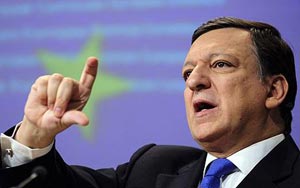Crisis, EU – Baltic States, Legislation
International Internet Magazine. Baltic States news & analytics
Friday, 02.01.2026, 18:27
Jose Manuel Barroso: Europe needs to reinvent itself
 Print version
Print version |
|---|
| Jose Manuel Barroso. |
Barroso made the comments Thursday (3 September) in a 41-page policy document laying out plans for the EU's near future and designed to woo members of the European Parliament into backing him for a second five-year term in office, informs EUObrserver/LETA.
Much of the paper focuses on the current economic crisis, with the commission having been strongly criticised in the past for acting too late and too timidly.
In the document, Barroso pledges to push for greater economic policy coordination and increase commission surveillance of public finances as well as push for stricter financial regulation and bring banks back to good health.
"The next months and years will determine how quickly and strongly we will recover from the crisis and how much influence we have in shaping a new world order," says the paper.
Under his leadership, the commission would over the next few years boost Europe's entrepreneurial culture, produce plans for a sustainable fisheries policy and launch a "major initiative" to adapt EU policies to the threat of climate change.
Two major reports on the remaining gaps in the internal market and the problems of cross-border purchasing are also promised.
Barroso's new priorities will need a "root and branch reform for the EU budget." While member states use the budget negotiations to fight to pay the least possible, the paper says the budget should be based on solidarity and budget-sharing and dips its toe into the thorny issue of tax by venturing that the "own resources" issue must not be shirked.
The paper will form the basis of discussions with each of the seven political groups in the European Parliament next week – discussions Mr Barroso is hoping will lead to a decision to put his nomination to a vote on 16 September.
The conservative commission chief, who was nominated by national governments in June, can count on the backing of the largest faction, the centre-right European People's Party, as well as the anti-federalist European Conservatives and Reformists, but needs broader backing among the 736 MEPs to secure a second five-year mandate.
His paper is a careful mixture of defence of the internal market but with emphasis on social values.
It speaks of the "destructive dichotomy of unregulated markets or over-powerful states."
The language reflects the fact that he needs to receive backing from the Socialists – who condemn what they call his over-attachment to the free market – and the Liberals, who have been strong critics of his handling of the financial crisis.
Meanwhile, a pledge to let member states alone choose whether to cultivate GM crops appears to be an overture to the Greens.
In an apparent response to criticism that he spent too much of his first appointment bowing to the wishes of large member states, Mr Barroso promised "new ambition."
"I spent a lot of energy in these last few years as someone forging a consensus," he said presenting the report, noting that it has now been proven that the EU can work with 27 member states. "I want to go further now."
His guidelines also contain plenty of sops to the parliament, an institution ever more conscious of its weightier role in the EU's institutional make-up.
In future, Mr Barroso promises regular participation in a "question hour" in the parliament, more meetings with political leaders in the assembly and to keep MEPs more in the loop on external policy.








 «The Baltic Course» Is Sold and Stays in Business!
«The Baltic Course» Is Sold and Stays in Business!

